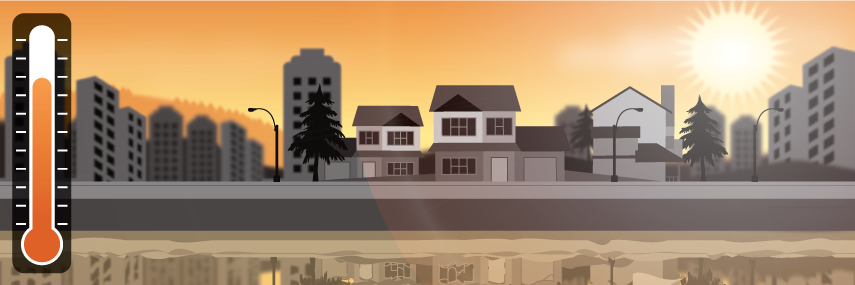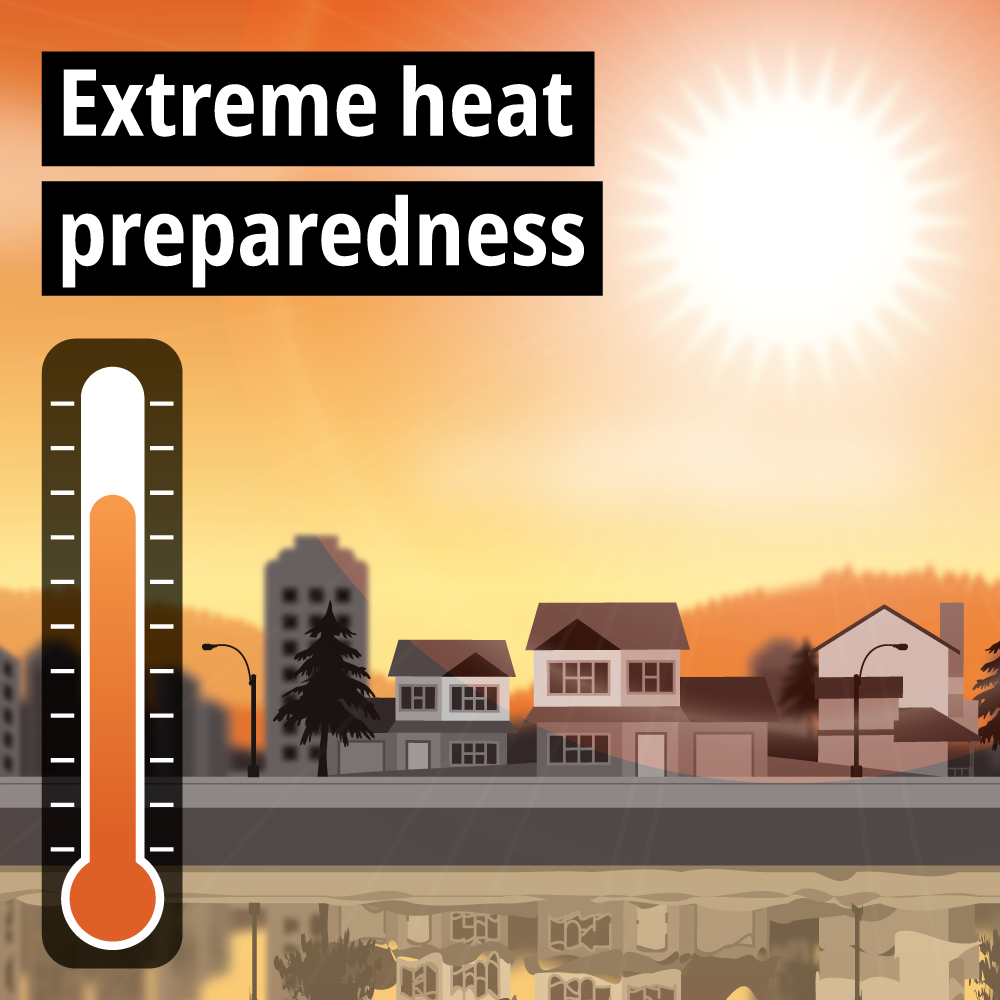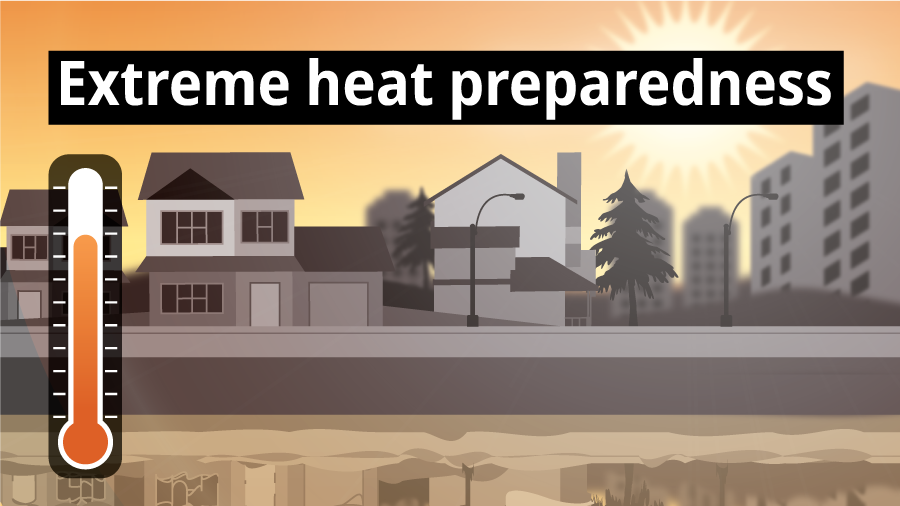Extreme heat preparedness social media package

Preparing for extreme heat is an important step toward building resilient communities. To help, we created an easy-to-use social media package with graphics and pre-written content.
Post this content directly to your own social media channels or follow @PreparedBC on Facebook, Instagram, and X (formerly Twitter) to share our posts!
Instructions for posting
- Copy-and-paste the content below in a new post
- Download, then attach the graphics below
- Option: add information, photos and hashtags specific to your community
- Double check the links and tagged accounts before you post
Graphics
Facebook or Instagram

X

Content
X
Before extreme heat
Heat-related illness can happen when you aren't able to cool your home during extreme heat. Plan ahead by identifying places in your community you can visit to get cool, such as libraries, shopping malls, or community cooling centres: PreparedBC.ca/ExtremeHeat
#BCHeat
During extreme heat, it's important to check in on loved ones and neighbours (especially older adults) to make sure they're staying hydrated and spending time in cool spaces. If you live alone, have a buddy who can check in on you: PreparedBC.ca/ExtremeHeat
#BCHeat
A few basic modifications to your home can make a big difference during extreme heat. For example, you can weather-strip doors and windows, cover windows with drapes or shades, and install a heat pump. Learn more: PreparedBC.ca/ExtremeHeat
#BCHeat
During extreme heat
Too much heat can be harmful to your health. Heat-related illnesses such as heat cramps, heat exhaustion, or heat stroke, are the result of your body gaining heat faster than it can cool down.
Learn to recognize and treat heat-related illnesses: PreparedBC.ca/ExtremeHeat #BCHeat
Stay safe and cool indoors during extreme heat by taking the following steps:
• Stay in air-conditioned spaces
• Sleep in the coolest room of your residence
• Take cool baths/showers
• Drink plenty of water
Learn more: PreparedBC.ca/ExtremeHeat #BCHeat
Stay safe and cool outdoors during extreme heat:
• Lower your activity level
• Never leave children or pets in a parked car
• Stay in the shade and wear UV protection
• Seek cooler, breezier areas like parks near water & trees
Learn more: PreparedBC.ca/ExtremeHeat #BCHeat
Facebook or Instragram
Before extreme heat
Heat-related illness can happen when you aren't able to cool your home during extreme heat. Plan ahead by identifying places in your community you can visit to get cool, such as libraries, shopping malls, or community cooling centres: PreparedBC.ca/ExtremeHeat
During extreme heat, it's important to check in on loved ones and neighbours (especially older adults) to make sure they're staying hydrated and spending time in cool spaces. If you live alone, have a buddy who can check in on you: PreparedBC.ca/ExtremeHeat
A few basic modifications to your home can make a big difference during extreme heat:
• Install a window air conditioner in at least one room
• Install thermal curtains or window coverings
• Keep easy-to-read thermometers available to accurately measure indoor temperatures (31°C or higher is dangerous for vulnerable people)
• Have fans available to help move cooler air indoors during the late evening and early morning hours
• Install a heat pump
Learn more: PreparedBC.ca/ExtremeHeat
During extreme heat
Extreme heat is when temperatures are already very hot and daytime and nighttime get even hotter every day and are well above normal seasonal temperatures. Here are some tips to help stay cool during extreme heat:
• Relocate to a cooler location if you have planned to do so.
• Reconfigure the coolest location in your home so you can sleep there at night.
• Check in with your pre-identified extreme heat buddy. If you don’t have one, try to reach out to someone you trust as soon as possible.
• Put up external window covers to block the sun if you can safely do so.
• Close your curtains and blinds
• Ensure digital thermometers have batteries
• Make ice and prepare jugs of cool water.
• Check that you have working fans.
• Keep doors and windows closed between 10 a.m. and 8 p.m. to trap cooler air inside. Open them at 8 p.m. to allow cooler air in, and use fans (including kitchen and bathroom exhaust fans) to move cooler air through the house.
Learn more: PreparedBC.ca/ExtremeHeat
Too much heat can be harmful to your health. Heat-related illnesses such as heat cramps, heat exhaustion, or heat stroke, are the result of your body gaining heat faster than it can cool down.
Learn to recognize and treat heat-related illnesses: PreparedBC.ca/ExtremeHeat
Stay safe and cool indoors during extreme heat by taking the following steps:
• If you have air conditioning, turn it on. It does not need to be going full strength to help you stay safe
• If you have air conditioning, and vulnerable friends and family do not, bring them to your home
• If you do not have air conditioning, move to your pre-identified alternate location with air conditioning or cooler spaces
• Sleep in the coolest room of your residence, even if it’s not your bedroom. If it’s cooler outside, sleep outside if safe to do so
• Sleep with a wet sheet or in a wet shirt
• Take cold baths or showers to draw heat from your body
• Drink plenty of water, regardless of whether you feel thirsty. Be aware that sugary or alcoholic drinks cause dehydration
• If you are taking medication or have a health condition, ask your doctor or pharmacist if it increases your health risk in the heat and follow their recommendation
• If your doctor limits the amount you drink, or has you on water pills, ask how much you should drink while the weather is hot
Learn more: PreparedBC.ca/ExtremeHeat
Stay safe and cool outdoors during extreme heat:
• Lower your activity level. If you must do errands, do them early or late in the day when it’s cooler.
• Drink lots of water.
• Never leave children or pets in a parked car.
• Avoid direct sun by staying in the shade and wearing a hat and protective clothing. Use sunscreen and UV-protective eyewear.
• Seek cooler, breezier areas when outdoors, such as large parks near to water with lots of trees.
• If you work in a hot environment, discuss and act on ways to decrease heat exposure with your employer and coworkers.
Learn more: PreparedBC.ca/ExtremeHeat #BCHeat
